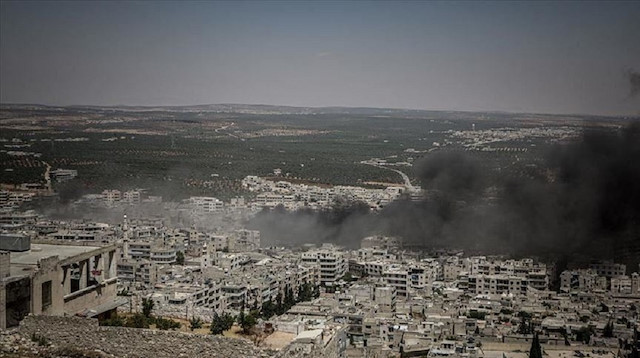
Supported by Iranian-backed foreign terrorist groups, Russian special forces and mercenaries
In violation of Astana agreements, Syrian regime forces backed by Russian warplanes have advanced to the borders of Khan Sheikhoun town in the northwestern Idlib province.
Advancing from Hama province south of Idlib in the past week, the regime forces -- which are also supported by Iranian-backed foreign terrorist groups, Russian special forces, and mercenaries -- launched both air and ground operations.
In an attempt to besiege the district, regime forces came 400 meters (0,24 miles) closer to the borders of Khan Sheikhoun and the strikes are ongoing in the key area of Nimr.
The forces have so far captured the town of Hobait, Tal Tari and Sukeik hills, Kafr Aydun and Sabbagiyya farms, and the Fakir point -- one of the entry points to the boundaries of Khan Sheikhoun district, where the regime had carried out a chemical weapon attack in 2017, killing 100 people.
They are about to cut the Aleppo-Damascus M5 highway passing through the district.
According to the Syrian military opposition, the observation post of Turkish Armed Forces in the southeast of Morek region in Hama province may face a threat in case the regime forces extended their attacks or continued to lay siege.
After a meeting held last September in Sochi, Russia, between Turkish President Recep Tayyip Erdogan and his Russian counterpart Vladimir Putin, the two sides agreed to set up a demilitarized zone -- in which acts of aggression are expressly prohibited -- in Idlib.
Under the deal, opposition groups in Idlib will remain in areas where they are already present, while Russia and Turkey will carry out joint patrols in the area to prevent a resumption of fighting.
On Oct. 10, the Turkish Defense Ministry announced that the Syrian opposition and other anti-regime groups had completed the withdrawal of heavy weapons from the Idlib demilitarized zone.
Despite the cease-fire agreement, the Assad regime and its allies have continued their low-intensity attacks on Idlib’s de-escalation zone.
The conflict in Syria began in 2011 when the Bashar al-Assad regime cracked down on demonstrators with unexpected ferocity.
Hello, the comments you share on our site are a valuable resource for other users. Please respect other users and different opinions. Do not use rude, offensive, derogatory, or discriminatory language.
The floor is all yours.










